 Tìm kiếm
Tìm kiếm
Chương I Luật Thi hành án hình sự 2019: Những quy định chung
| Số hiệu: | 41/2019/QH14 | Loại văn bản: | Luật |
| Nơi ban hành: | Quốc hội | Người ký: | Nguyễn Thị Kim Ngân |
| Ngày ban hành: | 14/06/2019 | Ngày hiệu lực: | 01/01/2020 |
| Ngày công báo: | 21/07/2019 | Số công báo: | Từ số 575 đến số 576 |
| Lĩnh vực: | Trách nhiệm hình sự | Tình trạng: | Còn hiệu lực |
TÓM TẮT VĂN BẢN
Phạm nhân đồng tính, chuyển giới được bố trí giam giữ riêng
Đây là nội dung nổi bật trong Luật Thi hành án hình sự 2019 được Quốc hội khóa XIV thông qua ngày 14/6/2019.
Theo đó, những phạm nhân đồng tính, chuyển đổi giới tính, hoặc chưa xác định rõ giới tính có thể được bố trí giam giữ riêng.
Ngoài ra, việc giam giữ phạm nhân được thực hiện như sau:
- Căn cứ vào tính chất của tội phạm, mức hình phạt, đặc điểm nhân thân thì Giám thị trại giam sẽ quyết định phân loại, chuyển khu giam giữ; phạm nhân được chia thành các đội, tổ để lao động, học tập và sinh hoạt.
- Trong thời gian chấp hành án phạt tù, phạm nhân được nhận xét, đánh giá kết quả chấp hành án phạt theo tuần, tháng, quý, 06 tháng và 01 năm; đảm bảo tính liên tục, khách quan, công bằng, công khai, dân chủ.
- Phạm nhân được phép nhận quà là tiền, đồ vật do thân nhân gửi qua đường bưu chính, nhưng không được quá 02 lần trong 01 tháng.
Luật Thi hành án hình sự 2019 có hiệu lực từ ngày 01/01/2020.
Văn bản tiếng việt
Văn bản tiếng anh
Luật này quy định nguyên tắc, trình tự, thủ tục, tổ chức, nhiệm vụ, quyền hạn của cơ quan, người có thẩm quyền trong thi hành bản án, quyết định về hình phạt tù, tử hình, cảnh cáo, cải tạo không giam giữ, cấm cư trú, quản chế, trục xuất, tước một số quyền công dân, cấm đảm nhiệm chức vụ, cấm hành nghề hoặc làm công việc nhất định, án treo, tha tù trước thời hạn có điều kiện, hình phạt đình chỉ hoạt động có thời hạn, đình chỉ hoạt động vĩnh viễn, cấm kinh doanh, cấm hoạt động trong một số lĩnh vực nhất định, cấm huy động vốn, biện pháp tư pháp; quyền, nghĩa vụ của người, pháp nhân thương mại chấp hành án hình sự, biện pháp tư pháp; trách nhiệm của cơ quan, tổ chức, cá nhân có liên quan trong thi hành án hình sự, biện pháp tư pháp.
1. Bản án, quyết định của Tòa án có hiệu lực pháp luật và đã có quyết định thi hành.
2. Bản án, quyết định của Tòa án được thi hành ngay theo quy định của Bộ luật Tố tụng hình sự hoặc kể từ ngày bản án có hiệu lực pháp luật theo quy định của Bộ luật Hình sự.
3. Quyết định của Tòa án tiếp nhận người đang chấp hành án phạt tù ở nước ngoài về Việt Nam chấp hành án và đã có quyết định thi hành; quyết định của Tòa án chuyển giao người đang chấp hành án phạt tù tại Việt Nam cho nước ngoài.
4. Bản án, quyết định về áp dụng biện pháp tư pháp bắt buộc chữa bệnh, giáo dục tại trường giáo dưỡng; buộc khôi phục lại tình trạng ban đầu, buộc thực hiện một số biện pháp nhằm khắc phục, ngăn chặn hậu quả tiếp tục xảy ra đối với pháp nhân thương mại thuộc thẩm quyền của cơ quan thi hành án hình sự.
Trong Luật này, các từ ngữ dưới đây được hiểu như sau:
1. Người chấp hành án là người bị kết án, phải chịu hình phạt theo bản án, quyết định của Tòa án có hiệu lực pháp luật và đã có quyết định thi hành.
2. Phạm nhân là người đang chấp hành án phạt tù có thời hạn, tù chung thân.
3. Cơ sở giam giữ phạm nhân là nơi tổ chức quản lý, giam giữ và giáo dục cải tạo phạm nhân, bao gồm trại giam, trại tạm giam, nhà tạm giữ.
4. Thi hành án phạt tù là việc cơ quan, người có thẩm quyền theo quy định của Luật này buộc người bị kết án phạt tù có thời hạn, tù chung thân phải chịu sự quản lý giam giữ, giáo dục cải tạo.
5. Thi hành án tử hình là việc cơ quan, người có thẩm quyền theo quy định của Luật này tước bỏ tính mạng của người bị kết án tử hình.
6. Thi hành án treo là việc cơ quan, người có thẩm quyền theo quy định của Luật này giám sát, giáo dục người bị kết án phạt tù được hưởng án treo trong thời gian thử thách.
7. Thi hành quyết định tha tù trước thời hạn có điều kiện là việc cơ quan, người có thẩm quyền theo quy định của Luật này quản lý người được tha tù trước thời hạn có điều kiện trong thời gian thử thách.
8. Thi hành án phạt cải tạo không giam giữ là việc cơ quan, người có thẩm quyền theo quy định của Luật này giám sát, giáo dục người chấp hành án tại nơi cư trú hoặc nơi làm việc, học tập; khấu trừ một phần thu nhập sung quỹ nhà nước, giám sát việc thực hiện một số công việc lao động phục vụ cộng đồng theo bản án, quyết định của Tòa án có hiệu lực pháp luật.
9. Thi hành án phạt cấm cư trú là việc cơ quan, người có thẩm quyền theo quy định của Luật này buộc người chấp hành án không được tạm trú, thường trú ở một số địa phương nhất định theo bản án, quyết định của Tòa án có hiệu lực pháp luật.
10. Thi hành án phạt quản chế là việc cơ quan, người có thẩm quyền theo quy định của Luật này buộc người chấp hành án phải cư trú, làm ăn sinh sống và cải tạo ở một địa phương nhất định dưới sự kiểm soát, giáo dục của chính quyền và Nhân dân địa phương theo bản án, quyết định của Tòa án có hiệu lực pháp luật.
11. Thi hành án phạt trục xuất là việc cơ quan, người có thẩm quyền theo quy định của Luật này buộc người chấp hành án phải rời khỏi lãnh thổ nước Cộng hòa xã hội chủ nghĩa Việt Nam theo bản án, quyết định của Tòa án có hiệu lực pháp luật.
12. Thi hành án phạt tước một số quyền công dân là việc cơ quan có thẩm quyền theo quy định của Luật này tước một hoặc một số quyền công dân của người chấp hành án theo bản án, quyết định của Tòa án có hiệu lực pháp luật.
13. Thi hành án phạt cấm đảm nhiệm chức vụ, cấm hành nghề hoặc làm công việc nhất định là việc cơ quan, tổ chức, người có thẩm quyền theo quy định của Luật này buộc người chấp hành án không được đảm nhiệm chức vụ, hành nghề hoặc làm công việc nhất định theo bản án, quyết định của Tòa án có hiệu lực pháp luật.
14. Thi hành biện pháp tư pháp bắt buộc chữa bệnh là việc cơ quan, người có thẩm quyền theo quy định của Luật này buộc người thực hiện hành vi nguy hiểm cho xã hội hoặc người đang chấp hành án mắc bệnh tâm thần, bệnh khác làm mất khả năng nhận thức hoặc khả năng điều khiển hành vi của mình phải điều trị tại cơ sở chữa bệnh bắt buộc theo quyết định của Tòa án, Viện kiểm sát.
15. Thi hành biện pháp tư pháp giáo dục tại trường giáo dưỡng là việc cơ quan, người có thẩm quyền theo quy định của Luật này đưa người dưới 18 tuổi vào trường giáo dưỡng để giáo dục theo bản án, quyết định của Tòa án có hiệu lực pháp luật.
16. Áp giải thi hành án là việc cơ quan, người có thẩm quyền theo quy định của Luật này buộc người chấp hành án phạt tù, tử hình, trục xuất đến nơi chấp hành án.
17. Trích xuất là việc thực hiện quyết định của cơ quan, người có thẩm quyền theo quy định của Luật này đưa phạm nhân, người bị kết án tử hình hoặc người chấp hành biện pháp tư pháp giáo dục tại trường giáo dưỡng ra khỏi nơi quản lý và chuyển giao cho cơ quan, người có thẩm quyền để phục vụ hoạt động điều tra, truy tố, xét xử, khám bệnh, chữa bệnh, quản lý giam giữ, giáo dục cải tạo trong thời hạn nhất định.
18. Danh bản là bản ghi thông tin tóm tắt về lý lịch, nhân dạng, ảnh chụp ba tư thế, in dấu vân hai ngón tay trỏ của người chấp hành án, người chấp hành biện pháp tư pháp do cơ quan có thẩm quyền lập và lưu giữ.
19. Chỉ bản là bản ghi thông tin tóm tắt về lý lịch và in dấu vân tất cả các ngón tay của người chấp hành án do cơ quan có thẩm quyền lập và lưu giữ.
20. Pháp nhân thương mại chấp hành án là pháp nhân thương mại bị kết án, phải chịu hình phạt, biện pháp tư pháp theo bản án, quyết định của Tòa án có hiệu lực pháp luật.
21. Thi hành hình phạt đình chỉ hoạt động có thời hạn là việc cơ quan, người có thẩm quyền theo quy định của Luật này buộc pháp nhân thương mại chấp hành án phải tạm dừng hoạt động đối với ngành, nghề trong một hoặc một số lĩnh vực bị đình chỉ hoạt động có thời hạn theo bản án, quyết định của Tòa án có hiệu lực pháp luật.
22. Thi hành hình phạt đình chỉ hoạt động vĩnh viễn là việc cơ quan, người có thẩm quyền theo quy định của Luật này buộc pháp nhân thương mại chấp hành án phải chấm dứt ngay hoạt động đối với ngành, nghề trong một hoặc một số lĩnh vực bị đình chỉ hoạt động vĩnh viễn hoặc toàn bộ hoạt động bị đình chỉ vĩnh viễn theo bản án, quyết định của Tòa án có hiệu lực pháp luật.
23. Thi hành hình phạt cấm kinh doanh, cấm hoạt động trong một số lĩnh vực nhất định là việc cơ quan, người có thẩm quyền theo quy định của Luật này buộc pháp nhân thương mại chấp hành án không được tiếp tục kinh doanh, hoạt động đối với ngành, nghề trong lĩnh vực bị cấm trong thời hạn theo bản án, quyết định của Tòa án có hiệu lực pháp luật.
24. Thi hành hình phạt cấm huy động vốn là việc cơ quan, người có thẩm quyền theo quy định của Luật này buộc pháp nhân thương mại chấp hành án không được thực hiện một hoặc một số hình thức huy động vốn trong thời hạn bị cấm theo bản án, quyết định của Tòa án có hiệu lực pháp luật.
25. Cơ quan quản lý nhà nước đối với pháp nhân thương mại chấp hành án là cơ quan có thẩm quyền đăng ký kinh doanh, cấp giấy chứng nhận đăng ký, cấp giấy phép, chấp thuận cho pháp nhân thương mại hoạt động, giám sát, theo dõi pháp nhân thương mại hoạt động được cơ quan thi hành án hình sự có thẩm quyền yêu cầu thực hiện một hoặc một số nhiệm vụ để bảo đảm thi hành hình phạt, biện pháp tư pháp đối với pháp nhân thương mại chấp hành án.
1. Tuân thủ Hiến pháp, pháp luật, bảo đảm lợi ích của Nhà nước, quyền, lợi ích hợp pháp của cơ quan, tổ chức, cá nhân.
2. Bản án, quyết định của Tòa án có hiệu lực pháp luật phải được cơ quan, tổ chức, cá nhân tôn trọng; cơ quan, tổ chức, cá nhân có liên quan phải nghiêm chỉnh chấp hành.
3. Bảo đảm nhân đạo xã hội chủ nghĩa; tôn trọng danh dự, nhân phẩm, quyền, lợi ích hợp pháp của người chấp hành án, người chấp hành biện pháp tư pháp, quyền, lợi ích hợp pháp của pháp nhân thương mại chấp hành án.
4. Kết hợp trừng trị và giáo dục cải tạo trong việc thi hành án; áp dụng biện pháp giáo dục cải tạo phải trên cơ sở tính chất, mức độ phạm tội, độ tuổi, sức khỏe, giới tính, trình độ học vấn và các đặc điểm nhân thân khác của người chấp hành án.
5. Thi hành án đối với người dưới 18 tuổi chủ yếu nhằm giáo dục, giúp đỡ họ sửa chữa sai lầm, phát triển lành mạnh và trở thành người có ích cho xã hội.
6. Khuyến khích người chấp hành án ăn năn hối cải, tích cực học tập, lao động cải tạo, tự nguyện bồi thường thiệt hại.
7. Bảo đảm quyền khiếu nại, tố cáo hành vi, quyết định trái pháp luật của cơ quan, người có thẩm quyền trong thi hành án hình sự.
8. Bảo đảm sự tham gia của cơ quan, tổ chức, cá nhân và gia đình trong hoạt động thi hành án hình sự, tái hòa nhập cộng đồng theo quy định của pháp luật.
Quốc hội, Hội đồng nhân dân, Mặt trận Tổ quốc Việt Nam và các tổ chức thành viên của Mặt trận giám sát hoạt động của cơ quan, tổ chức, người có thẩm quyền và cơ quan, tổ chức, cá nhân khác có liên quan trong thi hành án hình sự theo quy định của pháp luật.
Viện kiểm sát nhân dân kiểm sát việc tuân theo pháp luật của cơ quan, người có thẩm quyền và cơ quan, tổ chức, cá nhân khác có liên quan trong thi hành án hình sự.
1. Chính phủ, Bộ, cơ quan ngang Bộ, cơ quan thuộc Chính phủ có trách nhiệm tổ chức, chỉ đạo công tác phổ biến, giáo dục pháp luật về thi hành án hình sự.
2. Ủy ban nhân dân các cấp, cơ quan, tổ chức khác, trong phạm vi nhiệm vụ, quyền hạn của mình, có trách nhiệm tổ chức thực hiện việc phổ biến, giáo dục pháp luật, vận động Nhân dân chấp hành pháp luật về thi hành án hình sự.
Hợp tác quốc tế trong thi hành án hình sự giữa cơ quan có thẩm quyền của nước Cộng hòa xã hội chủ nghĩa Việt Nam với cơ quan có thẩm quyền tương ứng của nước ngoài được thực hiện trên cơ sở tôn trọng độc lập, chủ quyền và toàn vẹn lãnh thổ, không can thiệp vào công việc nội bộ của nhau, bình đẳng, cùng có lợi, phù hợp với Hiến pháp, pháp luật của Việt Nam và điều ước quốc tế mà nước Cộng hòa xã hội chủ nghĩa Việt Nam là thành viên.
Trường hợp giữa Việt Nam và nước có liên quan chưa có điều ước quốc tế thì việc hợp tác quốc tế trong thi hành án hình sự được thực hiện theo nguyên tắc có đi có lại nhưng không trái với Hiến pháp của Việt Nam, phù hợp với pháp luật quốc tế và tập quán quốc tế.
1. Phá hủy cơ sở quản lý, giam giữ; hủy hoại hoặc cố ý làm hư hỏng tài sản của cơ sở quản lý, giam giữ; tổ chức trốn hoặc trốn khỏi nơi quản lý, giam giữ; tổ chức trốn hoặc trốn khi đang bị áp giải, dẫn giải; đánh tháo phạm nhân, người chấp hành biện pháp tư pháp, người bị áp giải, dẫn giải.
2. Không chấp hành quyết định thi hành án hình sự; cản trở hoặc chống lại việc thực hiện nội quy, quy chế về thi hành án hình sự hoặc quyết định, yêu cầu của cơ quan, người có thẩm quyền trong thi hành án hình sự.
3. Tổ chức, kích động, xúi giục, lôi kéo, dụ dỗ, giúp sức, cưỡng bức người khác vi phạm pháp luật về thi hành án hình sự; trả thù, xâm phạm tính mạng, sức khỏe, danh dự, nhân phẩm, tài sản của người có trách nhiệm thi hành án hình sự.
4. Không ra quyết định thi hành án hình sự; không thi hành quyết định trả tự do theo quy định của pháp luật và quyết định khác của cơ quan, người có thẩm quyền trong thi hành án hình sự.
5. Đưa hối lộ, nhận hối lộ, môi giới hối lộ, nhũng nhiễu trong thi hành án hình sự.
6. Tha trái pháp luật người đang bị giam, người bị áp giải thi hành án; thiếu trách nhiệm trong việc quản lý, canh gác, áp giải thi hành án để người chấp hành án phạt tù, án tử hình hoặc án phạt trục xuất trốn.
7. Lợi dụng, lạm dụng chức vụ, quyền hạn để đề nghị miễn, giảm, hoãn, tạm đình chỉ, tha tù trước thời hạn có điều kiện, rút ngắn thời gian thử thách cho người không đủ điều kiện; không đề nghị cho người đủ điều kiện được miễn, giảm, hoãn, tạm đình chỉ, tha tù trước thời hạn có điều kiện, rút ngắn thời gian thử thách; đề nghị hoặc không đề nghị chấm dứt trước thời hạn việc chấp hành biện pháp tư pháp, hoãn, đình chỉ thi hành biện pháp tư pháp; cản trở người, pháp nhân thương mại chấp hành án thực hiện các quyền theo quy định của Luật này.
8. Tra tấn và các hình thức đối xử hoặc trừng phạt tàn bạo, vô nhân đạo hoặc hạ nhục người chấp hành án, biện pháp tư pháp.
9. Kỳ thị, phân biệt đối xử hoặc xâm phạm quyền, lợi ích hợp pháp của người, pháp nhân thương mại chấp hành án.
10. Cấp hoặc từ chối cấp trái quy định của pháp luật quyết định, giấy chứng nhận, xác nhận hoặc giấy tờ khác về thi hành án hình sự.
11. Làm sai lệch hồ sơ, sổ sách về thi hành án hình sự.
This Law sets forth principles, procedures, organization, tasks and powers of competent authorities and persons in the execution of judgments and decisions on prison sentences, death sentences, warnings, community sentences, prohibition from residence, mandatory supervision, expulsion sentences, deprivation of certain citizenship rights, prohibition from holding certain positions, practicing profession or performing certain jobs, suspended sentences, parole, suspension of operation, permanent shutdown, ban from doing business, ban from operating in certain fields, prohibition from raising capital, judicial measures; rights and obligations of persons and corporate legal entities serving sentences or judicial measures; responsibilities of agencies, organizations, and individuals related to execution of criminal judgments and judicial measures.
Article 2. Executable judgments and decisions
1. Court judgments and decisions which have become legally effective and have had execution decisions:
2. Court judgments and decisions to be executed without delay under the Criminal Procedure Code or from their effective dates under the Criminal Code.
3. Decisions of courts to receive persons currently serving prison sentences in a foreign country to Vietnam to serve their sentences in Vietnam, which have had execution decisions; court decisions to transfer persons currently serving prison sentences in Vietnam to a foreign country.
4. Judgments and decisions to apply judicial measures of compulsory medical treatment, education in reformatories; compulsory restoration of original state; compulsory implementation of some measures for mitigation and prevention of consequences against corporate legal entities under power of criminal judgment execution agencies.
Article 3. Interpretation of terms
For the purposes of this Law, these terms below shall be construed as follows:
1. “sentenced person” means a person who has been convicted of a crime and subject to a penalty under a court judgment or decision which becomes legally effective and has had an execution decision.
2. “inmate” means a person who is currently serving a termed prison sentence or a life sentence.
3. “place of detention” means a place where inmates are supervised, incarcerated and educated, including prisons, detention centers, custody houses.
4. “execution of prison sentence” means that a competent authority or person defined in this Law puts a person receiving a termed prison sentence or a life sentence under control, incarceration and education.
5. “execution of death sentence” means that a competent authority or person defined in this Law deprives the life of a person sentenced to death.
6. “execution of suspended sentence” means that a competent authority or person defined in this Law supervises and educates a person who receives a suspended sentence during the probation period.
7. “execution of parole” means that a competent authority or person defined in this Law supervises a person on parole (hereinafter referred to as parolee) during probation period.
8. “execution of community sentence” means that that a competent authority or person defined in this Law supervises and educates a sentenced person at their place of residence, work or study; deducts partial amount from their income and transfer it to state budget, and supervises their performance of community services under a legally effective court judgment or decision.
9. “execution of prohibition from residence sentence” means that a competent authority or person defined in this Law forces a sentenced person not to temporarily or permanently reside in certain administrative divisions under a legally effective court judgment or decision.
10. “execution of mandatory supervision” means that a competent authority or person defined in this Law forces a sentenced person to reside, make a living and rehabilitate themselves in given administrative division under the supervision and education of the local administration and the people under a legally effective court judgment or decision.
11. “execution of expulsion sentence” means that a competent authority or person defined in this Law forces a sentenced person to leave the territory of the Socialist Republic of Vietnam under a legally effective court judgment or decision.
12. “execution of the sentence of deprivation of certain citizenship rights” means that a competent authority or person defined in this Law deprives a sentenced person of certain citizenship rights under a legally effective court judgment or decision.
13. “execution of the sentence of prohibition from holding certain positions, practicing certain professions or performing certain jobs” means that a competent authority or person defined in this Law forces a sentenced person not to hold certain positions, practicing certain professions or performing certain jobs under a legally effective court judgment or decision.
14. “execution of the judicial measure of compulsory medical treatment” means that a competent authority or person defined in this Law forces a person who has committed an act dangerous to the society or a sentenced person who suffers a mental disease or another disease that has deprived him/her of the consciousness or act control capacity to receive treatment at a compulsory health facility under a court or procuracy decision.
15. “execution of the judicial measure of education in reformatories” means that a competent authority or person defined in this Law sends a person under 18 years of age (hereinafter referred to as minor) to a reformatory school for education under a legally effective court judgment or decision.
16. “escort for judgment execution” means that a competent authority or person defined in this Law forces a person receiving a prison sentence, death sentence, or expulsion sentence to a place where he/she will serve the sentence.
17. “transfer” means the implementation of a decision of a competent authority or person defined in this Law to take an inmate, a person sentenced to death or a person serving the judicial measure of education in a reformatory out of their place of supervision and deliver over him/her to a competent authority or person for the purposes of investigation, prosecution, trial, medical examination and treatment, incarceration management, and education for a certain period.
18. “personal identification statement” means a document containing brief information on the personal history, identification characteristics, photos of three positions, fingerprints of two index fingers of a sentenced person or a person serving a judicial measure, which is made and kept by competent authorities.
19. “fingerprint sheet” means a document containing brief information on the personal history and all fingerprints of a sentenced person, which is made and kept by competent authorities.
20. “sentenced corporate legal entity” means a corporate legal entity which has been convicted of a crime and has incurred a penalty or judicial measure under a legally effective court judgment or decision.
21. “execution of sentence of suspension of operation” means that a competent authority or person defined in this Law forces a sentenced corporate legal entity to suspend its operation in one or certain lines of business subject to suspension of operation under a legally effective court judgment or decision.
22. “execution of sentence of permanent shutdown” means that a competent authority or person defined in this Law forces a sentenced corporate legal entity to shut its operation down in one or certain lines of business or the entire operation subject to permanent shutdown under a legally effective court judgment or decision.
23. “execution of sentence of ban from doing business, ban from operating in certain fields” means that a competent authority or person defined in this Law forces a sentenced corporate legal entity to cease its operation in certain banned lines of business for a given period of time under a legally effective court judgment or decision.
24. “execution of sentence of prohibition from raising capital” means that a competent authority or person defined in this Law forces a sentenced corporate legal entity to refrain from raising capital in one or certain forms for a given prohibition period time under a legally effective court judgment or decision.
25. “regulatory agencies supervising sentenced corporate legal entity” means agencies which are competent to register business, issue a certificate of registration, issue an operation license or approval to a corporate legal entity and supervise the operation of the corporate legal entity, and are requested by criminal judgment execution agencies to perform one or certain tasks to ensure the execution of penalty or judicial measure against the sentenced corporate legal entity.
Article 4. Principles of execution of criminal judgments
1. Abidance by the Constitution and law, guarantee of the interests of the State and the legitimate rights and interests of agencies, organizations, and individuals.
2. Legally effective court judgments and decisions must be respected and strictly complied with by agencies, organizations, and individuals.
3. Guarantee of socialist humanism; respect for the dignity and legitimate rights and interests of sentenced persons, persons serving judicial measures, and legitimate rights and interests of sentenced corporate legal entities.
4. Combination of punishment and education in the execution of judgments; application of educational measures based on the nature and severity of crimes committed, age, gender, educational level and other personal characteristics of sentenced persons.
5. Execution of judgments against minors mainly aims to educate and help them correct their wrongful acts, develop healthily and become useful to the society.
6. Sentenced persons are encouraged to show their repentance, actively study and work to reform themselves and voluntarily pay compensations.
7. Guarantee of the right to complain and denounce illegal acts and decisions of competent authorities or persons in execution of criminal judgments.
8. Guarantee of the participation of agencies, organizations, individuals, and families in the execution of criminal judgments and community re-integration as per the law.
Article 5. Responsibilities of agencies, organizations, and individuals to cooperate in the execution of criminal judgments
Agencies, organizations and individuals shall, within the scope of their tasks, powers and obligations, cooperate with one another and comply with requests of competent agencies under this Law in the execution of criminal judgments.
Article 6. Supervision of execution of criminal judgments
The National Assembly, the People's Councils, the Vietnam Fatherland Front and affiliates thereof shall supervise activities of competent agencies and organizations and other relevant agencies and organizations in the execution of criminal judgments as per the law.
Article 7. Oversight of execution of criminal judgments
The People’s Procuracy shall oversee the adherence to law of competent authorities and persons and other agencies, organizations, and individuals involved in execution of criminal judgments.
Article 8. Raising public awareness and education of law on execution of criminal judgments
1. The Government, ministries, ministerial-level agencies and Governmental agencies shall organize and direct raising of public awareness and education of law on execution of criminal judgments.
2. The People's Committees and other agencies and organizations shall, within the ambit of their respective tasks and powers, organize raising of public awareness and education of law on execution of criminal judgments and mobilize the people to observe the law on execution of criminal judgments.
Article 9. International cooperation in execution of criminal judgments
International cooperation in execution of criminal judgments between competent agencies of the Socialist Republic of Vietnam and respective competent agencies of foreign counterparts shall be carried out on the principle of respect for national independence, sovereignty, territorial integrity and non-intervention in one another's internal affairs, equality and mutual benefit, compliance with the Constitution of the Socialist Republic of Vietnam and the fundamental principles of international law to which Vietnam is a signatory.
If Vietnam and a country have not had any international treaty, their international cooperation in execution of criminal judgments shall be carried out in conformity with principle of reciprocity provided not in contravention of the Constitution of Vietnam and in accordance with international law and practices.
Article 10. Prohibited acts in the execution of criminal judgments
1. Destroying supervision and detention facilities; destroying and intentionally damaging property of supervision and detention facilities; organizing escape or escaping from supervision and detention places; organizing escape or escaping while being escorted for judgment execution; rescuing inmates, persons serving judicial measures or person being escorted for judgment execution.
2. Failing to abide by decisions to execute criminal judgments; obstructing or resisting the implementation of internal regulations on execution of criminal judgments or decisions or requests of competent authorities or persons in execution of criminal judgments.
3. Organizing, provoking, instigating, involving, enticing, abetting or forcing others to violate the law on execution of criminal judgments; taking revenge on or infringing upon the life, health, honor, dignity and property of persons in charge of executing criminal judgments.
4. Failing to issue decisions to execute criminal judgments; failing to execute decisions to set free persons who are released in accordance with law and other decisions of competent authorities or persons in execution of criminal judgments.
5. Giving, taking, brokering bribes, or causing harassment in execution of criminal judgments.
6. Illegally releasing persons who are in detention, are being escorted for judgment execution; showing irresponsibility in the management, guard and escort for judgment execution resulting in the escape of persons serving a prison sentence, death sentence or expulsion sentence.
7. Abusing positions and powers to request exemption from or reduction of the duration, postponement or suspension of the serving of a sentence, parole, or shortening probation period for ineligible persons; failing to request exemption from or reduction of the duration, postponement or suspension of serving a sentence, parole, or shortening probation period for eligible persons; requesting or failing to request early termination of serving judicial measures, postponement or suspension of serving judicial measures; obstructing sentenced persons or corporate legal entities from exercising the rights as specified in this Law.
8. Torturing and using brutal, inhuman or humiliating treatment or punishment against sentenced persons or persons serving judicial measures.
9. Differentiating, discriminating or infringing upon legitimate rights and interests of sentenced persons or corporate legal entities.
10. Issuing or refusing to issue decisions, certificates or other papers regarding execution of criminal judgments in violation of law.
11. Falsifying dossiers and records related to execution of criminal judgments.
Văn bản liên quan
Cập nhật
Điều 71. Hủy quyết định tha tù trước thời hạn có điều kiện
Điều 80. Hồ sơ thi hành án tử hình
Điều 81. Hoãn thi hành án tử hình
Điều 84. Quyết định thi hành án treo
Điều 110. Thủ tục miễn chấp hành thời hạn cấm cư trú còn lại
Điều 117. Thủ tục miễn chấp hành thời hạn quản chế còn lại
Bài viết liên quan
Bị cách chức có được hưởng lương hưu không?
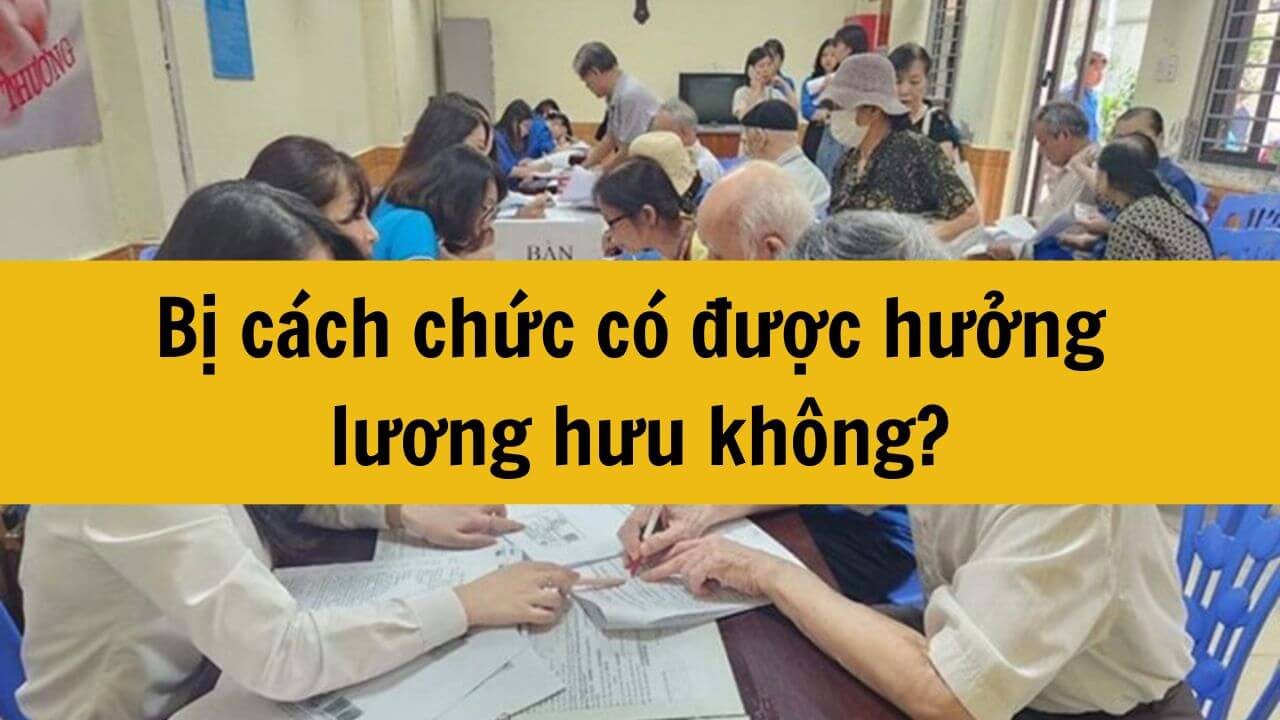
Bị cách chức có được hưởng lương hưu không?
Trong quá trình công tác, vì nhiều lý do khác nhau, một số cán bộ, công chức có thể bị cách chức hoặc kỷ luật. Một trong những câu hỏi thường gặp khi đó là liệu họ có còn được hưởng lương hưu sau khi nghỉ hưu hay không. Vấn đề này không chỉ ảnh hưởng đến quyền lợi cá nhân mà còn có tác động đến tài chính gia đình của người bị cách chức. Bài viết dưới đây sẽ giải đáp chi tiết về quy định pháp luật liên quan đến quyền lợi lương hưu trong trường hợp bị cách chức. 14/11/2024Bị khởi tố có được hưởng lương hưu không?

Bị khởi tố có được hưởng lương hưu không?
Khi một cá nhân bị khởi tố, nhiều vấn đề pháp lý và quyền lợi cá nhân sẽ phát sinh, trong đó có câu hỏi được nhiều người quan tâm. Liệu một người đang nhận lương hưu có tiếp tục được hưởng quyền lợi này khi bị khởi tố hay không? Đây là vấn đề không chỉ liên quan đến quyền lợi của người lao động sau khi nghỉ hưu mà còn ảnh hưởng đến gia đình và người thân của họ. Vậy hiện nay pháp luật quy định ra sao về vấn đề này. 14/11/2024Cán bộ, công chức đang đi tù có được hưởng lương hưu không?
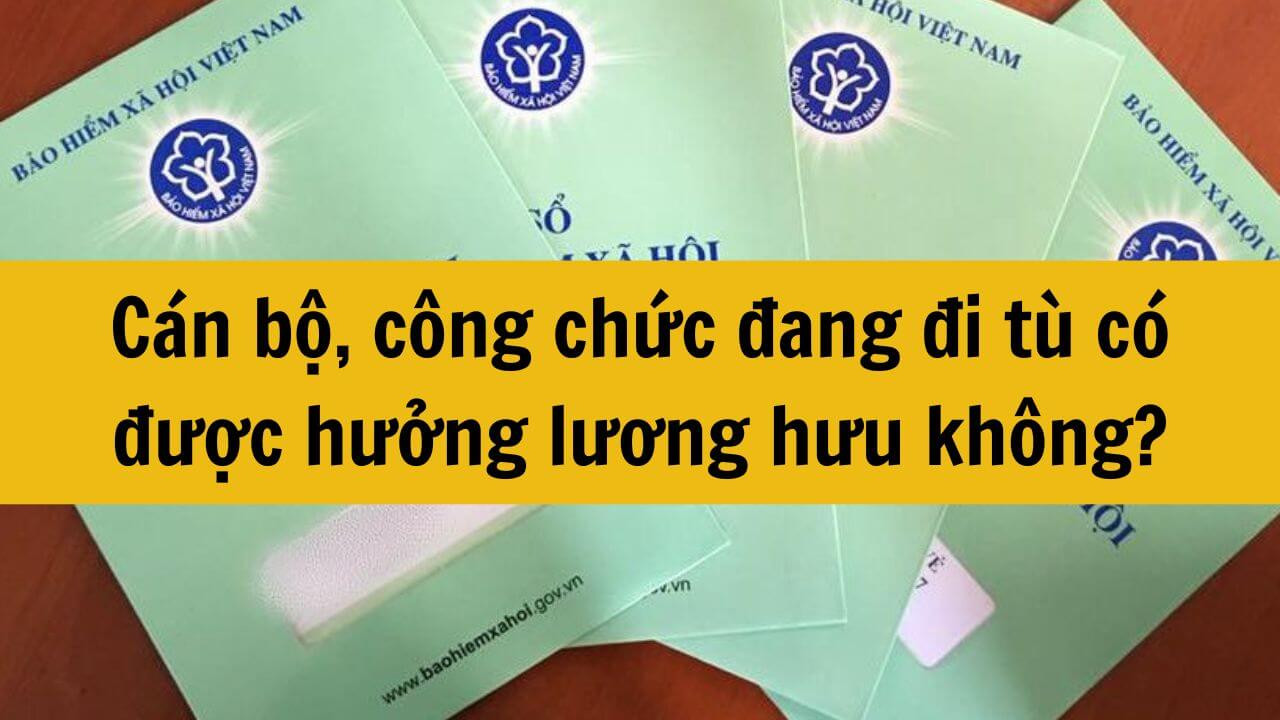
Cán bộ, công chức đang đi tù có được hưởng lương hưu không?
Khi cán bộ, công chức vi phạm pháp luật và phải thi hành án phạt tù, một câu hỏi đặt ra là liệu họ có tiếp tục được hưởng các quyền lợi về hưu trí, đặc biệt là lương hưu hay không. Đây là một vấn đề nhận được nhiều sự quan tâm, không chỉ vì quyền lợi cá nhân của người lao động mà còn ảnh hưởng đến ngân sách nhà nước và tính công bằng trong hệ thống an sinh xã hội. Vậy hiện nay, pháp luật có quy định ra sao về vấn đề này? 14/11/2024Mẫu hồ sơ mới nhất 2025 hưởng lương hưu đối với người lao động đang chấp hành hình phạt tù và hướng dẫn chi tiết
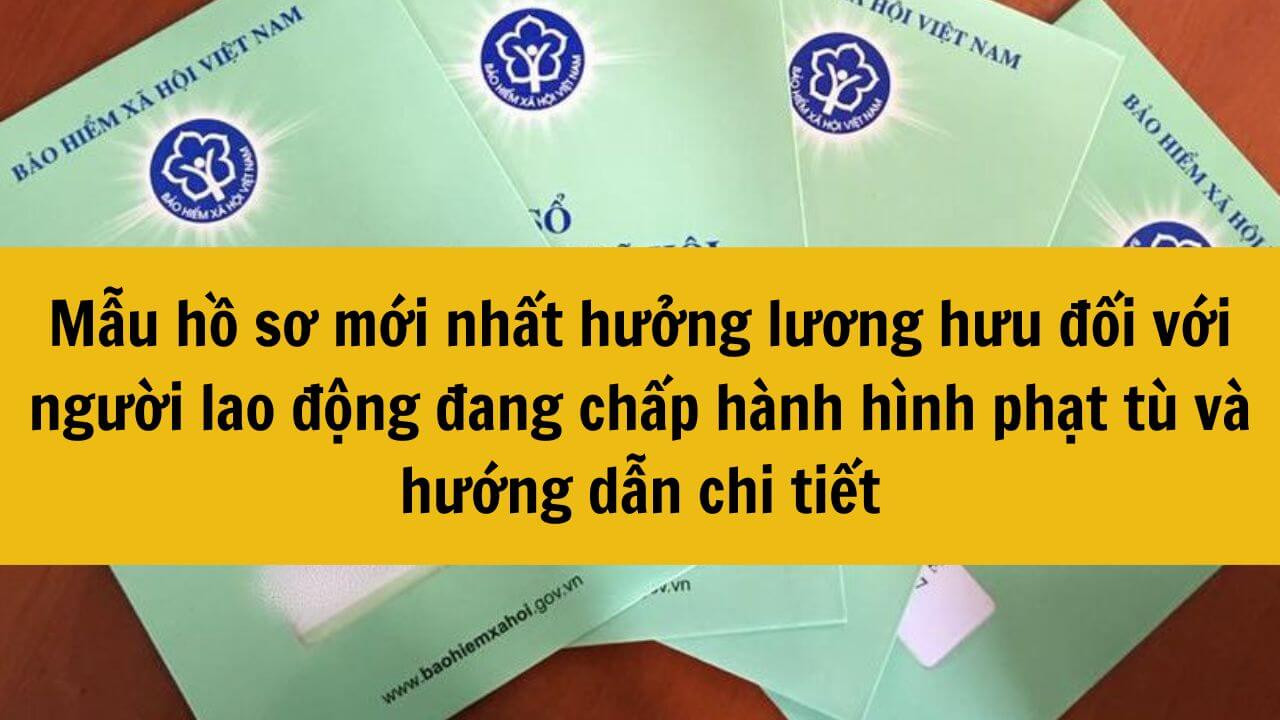
Mẫu hồ sơ mới nhất 2025 hưởng lương hưu đối với người lao động đang chấp hành hình phạt tù và hướng dẫn chi tiết
Trong bối cảnh nền kinh tế ngày càng phát triển, việc đảm bảo các quyền lợi cho mọi thành phần, kể cả những người lầm lỡ, trở nên ngày càng cần thiết. Một trong những vấn đề được nhiều người lao động quan tâm là việc những người bị kết án tù và phải đi tù có được hưởng lương hưu hay không, và nếu có thì cách thức nộp hồ sơ của họ như thế nào? Hãy cùng tìm hiểu sâu hơn về vấn đề này trong bài viết dưới đây. 14/11/2024Năm 2025 người lao động đi tù có được hưởng lương hưu không?
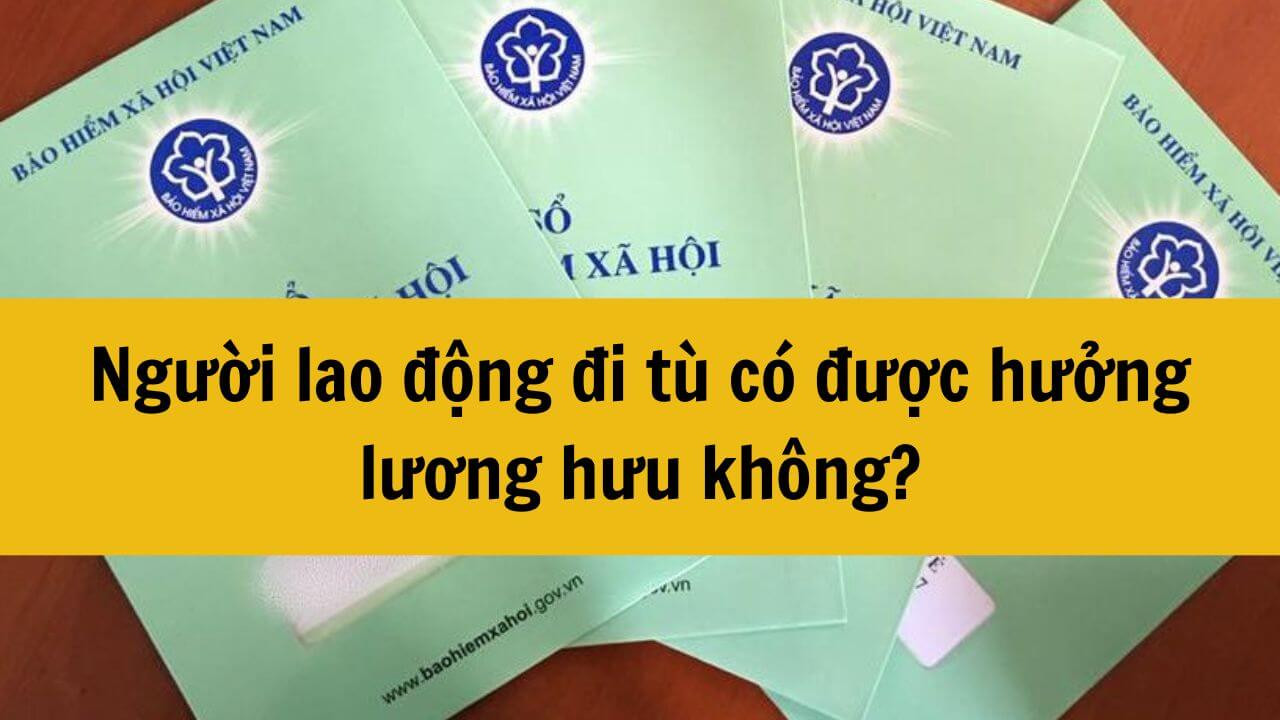
Năm 2025 người lao động đi tù có được hưởng lương hưu không?
Trong bối cảnh nền kinh tế ngày càng phát triển, việc đảm bảo các quyền lợi cho mọi thành phần, kể cả những người lầm lỡ, trở nên ngày càng cần thiết. Một trong những vấn đề được nhiều người lao động quan tâm là việc những người bị kết án tù và phải đi tù có được hưởng lương hưu hay không. Hãy cùng tìm hiểu sâu hơn về vấn đề này để có cái nhìn rõ ràng hơn về chính sách lương hưu và quyền lợi của người lao động trong năm 2025. 14/11/2024Hình phạt bổ sung đối với người được hưởng án treo
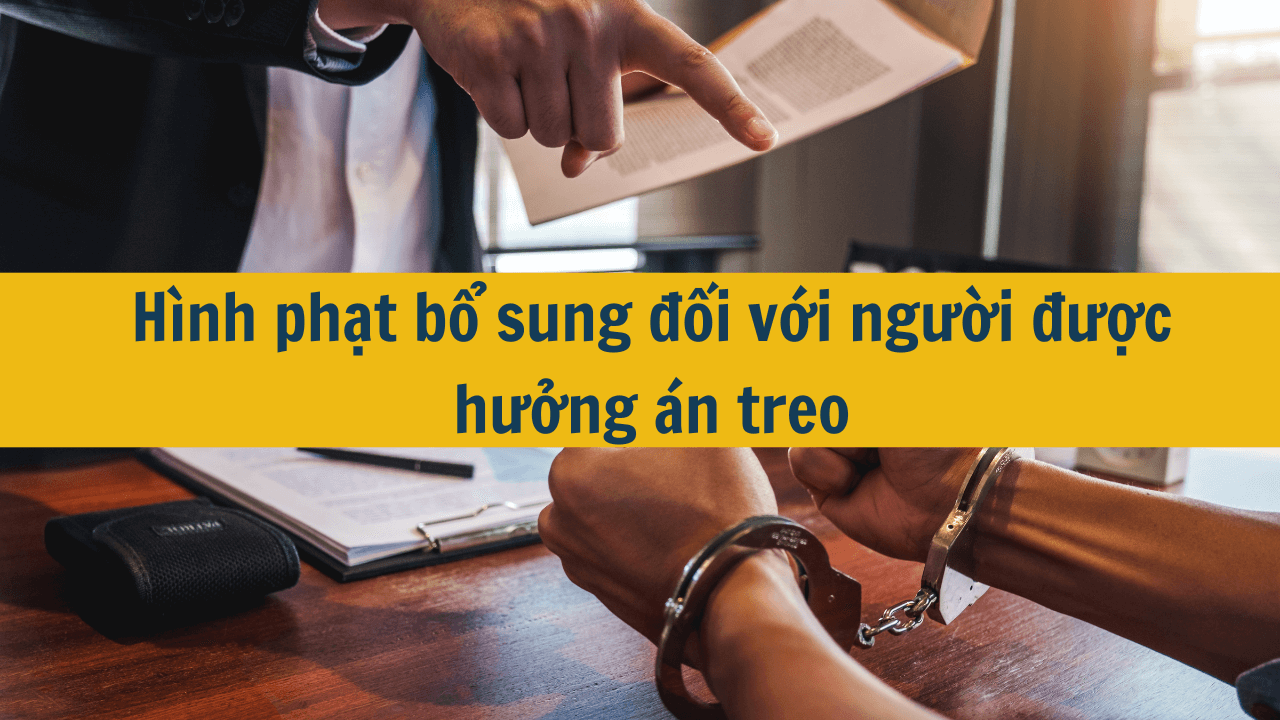
Hình phạt bổ sung đối với người được hưởng án treo
Tù treo hay án treo là biện pháp miễn chấp hành hình phạt tù có điều kiện, được Tòa án áp dụng đối với người phạm tội bị phạt tù không quá 03 năm, căn cứ vào nhân thân của người phạm tội và các tình tiết giảm nhẹ, xét thấy không cần bắt họ phải chấp hành hình phạt tù. Trong trường hợp phạt bổ sung thì quy định như thế nào? 10/11/2024Những ngành nghề cần có bằng cử nhân Luật

Những ngành nghề cần có bằng cử nhân Luật
Bằng cử nhân luật mở ra rất nhiều cơ hội nghề nghiệp đa dạng và hấp dẫn. Với kiến thức chuyên sâu về pháp luật, người tốt nghiệp ngành luật có thể lựa chọn làm việc tại nhiều lĩnh vực khác nhau. Dưới đây là một số ngành nghề phổ biến mà bạn có thể tham khảo. 06/11/2024Án treo là gì? Điều kiện hưởng án treo theo quy định pháp luật hiện hành


 Luật Thi hành án hình sự 2019 (Bản Word)
Luật Thi hành án hình sự 2019 (Bản Word)
 Luật Thi hành án hình sự 2019 (Bản Pdf)
Luật Thi hành án hình sự 2019 (Bản Pdf)